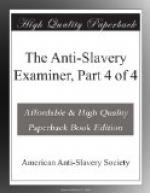Were O’Connell and his fellow Catholics non-resistants, because for two hundred years they submitted to exclusion from the House of Lords and the House of Commons, rather than qualify themselves for a seat by an oath abjuring the Pope? Were the non-juring Bishops of England non-resistants, when they went down to the grave without taking their seats in the House of Lords, rather than take an oath denying the Stuarts and to support the House of Hanover? Both might have purchased power at the price of one annual falsehood. There are some in this country who do not seem to think that price at all unreasonable. It were a rare compliment indeed to the non-resistants, if every exhibition of rigid principle on the part of an individual is to make the world suspect him of leaning towards their faith.
The Society is not opposed to government, but only to this Government based upon and acting for slavery.
With regard to the second charge, of exceeding its proper limits and trespassing on the rights of the minority, it is enough to say, that the object of the American Anti-Slavery Society is the “entire abolition of slavery in the United States.” Of course it is its duty to find out all the sources of pro-slavery influence in the land. It is its right, it is its duty to try every institution in the land, no matter how venerable, or sacred, by the touchstone of anti-slavery principle; and if it finds any one false, to proclaim that fact to the world, with more or less of energy, according to its importance in society. It has tried the Constitution, and pronounced it unsound.
No member’s conscience need be injured—The qualification for membership remains the same, “the belief that slave-holding is a heinous crime”—No new test has been set up—But the majority of the Society, for the time being, faithful to its duty of trying every institution by the light of the present day—of uttering its opinion on every passing event that touches the slave’s welfare, has seen it to be duty to sound forth its warning,
NO UNION WITH SLAVEHOLDERS.
No one who did not vote for the Resolution is responsible for it. No one is asked to quit our platform. We, the majority, only ask him to extend to our opinions the same toleration that we extend to him, and agreeing to differ on this point, work together where we can. We proscribe no man for difference of opinion.
It is said, that having refused in 1840, to say that a man ought to vote, on the ground that such a resolution would be tyrannical and intolerant, the Society is manifestly inconsistent now in taking upon itself to say that no abolitionist can consistently vote. But the inconsistency is only apparent and not real.




